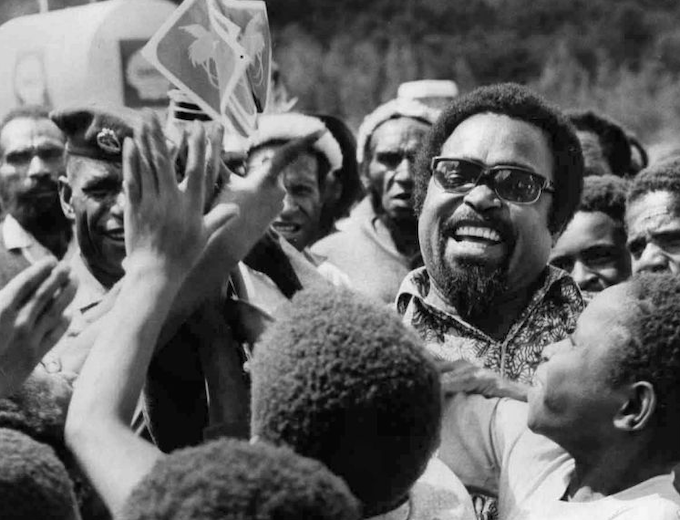
By Scott Waide in Lae, Papua New Guinea
Sir Michael was a man of many titles. He was father, grandfather and chief.
As a tribal leader, he was Sana, the peacemaker. His influence and his reputation extended beyond Papua New Guinea’s border to the Pacific and other parts of the region.
Sir Michael Somare has left an incredible legacy: 49 years in politics, a total of 17 years as prime minister spread out over three terms.
The state of Papua New Guinea bestowed upon him the title of grand chief in later years. Ordinary Papua New Guineans called him Chief, Father of the Nation, Papa, Tumbuna.
From the early years of his leadership, his family had to share their father with the rest of Papua New Guinea. Just after midnight, the eldest of the Somare clan, Bertha sent out a statement announced their father’s passing.
“Sir Michael was a loyal husband to our mother and great father first to her children, then grandchildren and great granddaughter. But we are endeared that many Papua New Guineans equally embraced Sir Michael as father and grandfather.”
The Grand Chief was diagnosed with late stage pancreatic cancer and was admitted to hospital on the February 19.
Father among first policemen
Michael Somare was born in Rabaul, East New Britain on 9 April 1936. His father, Ludwig, was one of the first policemen in the colonial territory.
He attended high school in Dregahafen in Morobe Province and later went on to work as a teacher and radio broadcaster.
Country Mourns for Sir Michael Somare https://t.co/hPTxJIEmxn #SirMichealSomare #FatheroftheNation pic.twitter.com/KP7ajE0vQ3
— EMTV (@EMTVOnline) February 26, 2021
During the 1960s, the young Michael Somare, became increasingly dissatisfied with Australian colonial rule and the racial discrimination. He, and other like-minded people began pushing for independence.
He attributed his entry into politics to the former Maprik MP, firebrand politician, Sir Peter Lus.
In 1972, and during an era that saw a strong push for decolonisation worldwide, Michael Somare, was elected Chief Minister. Three years later, in 1975, he led the country to independence when he became Papua New Guinea’s first Prime Minister.
Sir Michael was a pivotal, uniting force in a very fragmented country. He brought together the four culturally district regions and people who spoke close to a thousand different languages.
A master tactician
“A multitude of tribes – some of whom were forced to transition, rapidly, from the stone age into the age of artificial intelligence in less than half a century.
In politics, Sir Michael was a master tactician. Highly skilled in managing volatile political landscapes on multiple fronts. He survived multiple instances of political turmoil and retired in 2017.
As a regional leader, Sir Michael was the longest serving. In many instances, seeing the sons of those he served with take on leadership reins.
While Papua New Guineans have accepted that this day would come, many are still coming to terms with the news.
There is still a lot more to tell about Sir Michael.
Asia Pacific Report republishes articles from Lae-based Papua New Guinean television journalist Scott Waide’s blog, My Land, My Country, with permission.












































